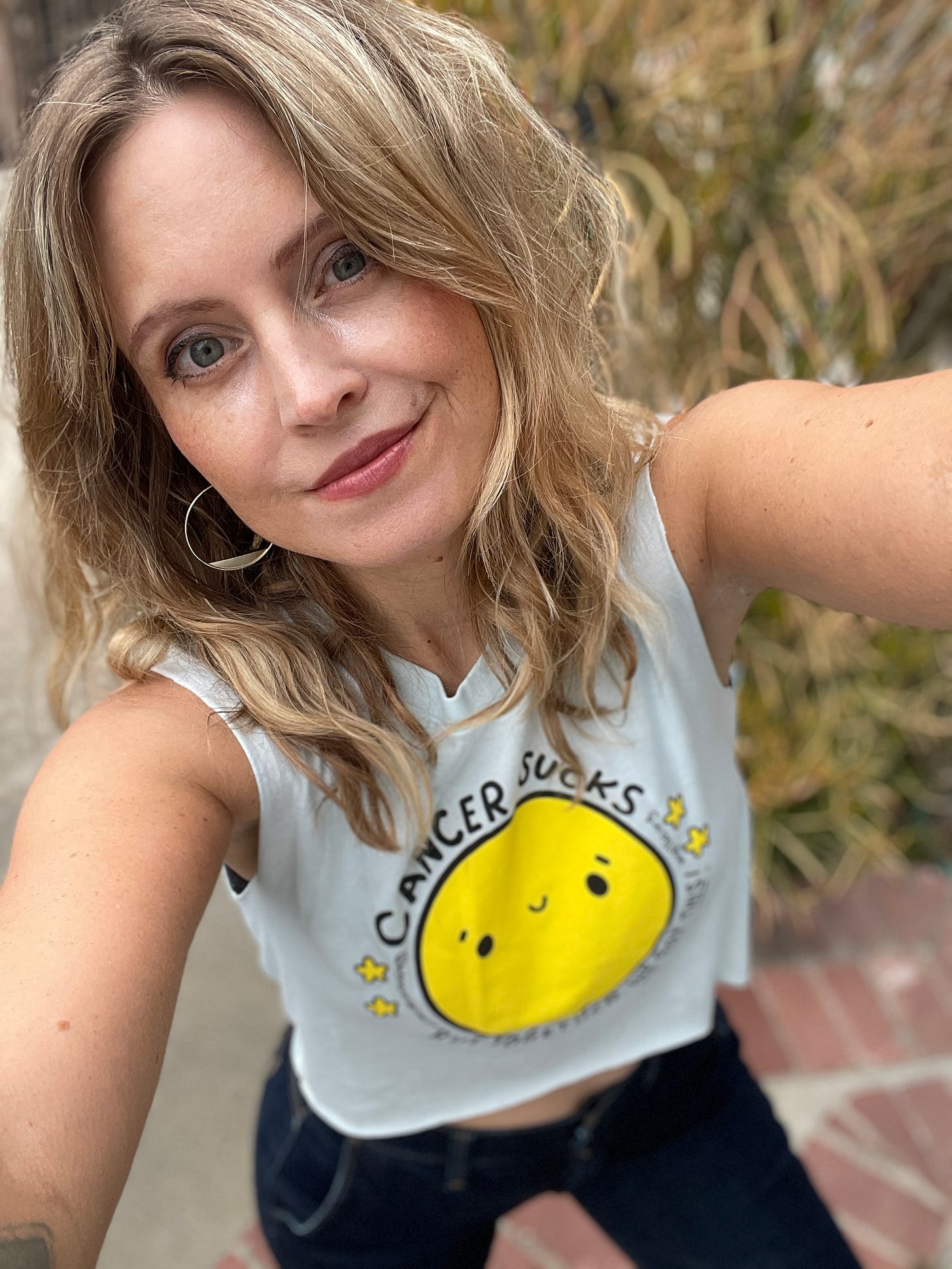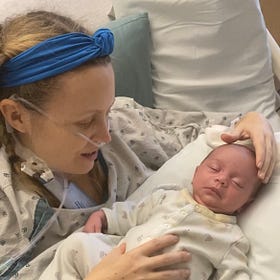9 Straightforward Ways to Avoid Certain Cancers
40% of cancer is considered preventable.
This newsletter is a reader-supported publication. If you find value in this work, please consider becoming a paid subscriber. For the cost of a latte, paid subscriptions are the fuel that keeps me doing this work. Thank you for your support!
I hope this finds you healthy and well, RDG readers.
1 in 5 people around the world will develop cancer. Most cancer cases are a result of terrible, bad luck, and nothing the patient could do would have avoided it, like me and aHUS. But, there are some forms of cancer we can avoid with simple daily habits.
I read recently that 40% of cases are considered preventable. That’s a very large chunk.
Cancer seems to touch all our lives in some shape or form.
I have so many dear friends and family who are tackling it.
I often get paranoia around cancer because it is so prevalent. I couldn’t imagine having cancer AS WELL AS aHUS.
So, I dug into some ways we can keep cancer at bay.
But first, this is a vital week to advocate for a better budget bill. Word on the street is, they’d like to ram it through this week. If you are represented by a Republican or Independent, be sure to give them a call. 1-202-224-3121
This bill is wildly unpopular in polls across the political spectrum for voters. From healthcare to public lands to AI protections - this bill is not in the best interest of most voters while it also adds to the deficit. So, it’s vital for our voices to be heard!
9 ways to help avoid cancer
You might read this list and say, “Duh, Taylor, this is obvious.” And yet, as we age it becomes even more important to have good habits. With the 40% of preventable cancers, actions have tangible impact.
I know we hear advice like this constantly - especially what NOT TO DO but I’m going to suggest ways you can implement the changes too.
None of these are shocking, but sometimes we need more of a HOW when it comes to changing our lives. Motivating can be hard, but when you see there are simple ways to incorporate change, I find it’s easier.
TIP: Try incorporating a new one of these each week or month. Identify which is your Achilles heal and start there. Even striving for 80% of a lifestyle change has a huge amount of benefit.
Eat more fruits and vegetables
A study of 27,000 people found cruciferous veggies (broccoli, cauliflower, cabbage, kale, Brussels sprouts) reduced the risk of six types of cancer. So, fill your shopping carts.
They found fruit reduced the risk of seven kinds of cancer. “A reduced risk of cancers of the digestive tract and larynx was found for high consumption of citrus fruit. Suggestive protections against several forms of cancer, mainly digestive tract cancers, were found for high consumption of apples and tomatoes.”
TIP: Shop the produce sales and batch cook veggies for reuse throughout the week. For those who struggle to eat more veggies, I love roasting. Salt, pepper, olive oil and a spritz of lemon does wonders. Also, I enjoy adding roasted veggies to a salad for a more dynamic flavor. Try adding spinach to smoothies, it really blends in well.
I often put fruit in my salad- slices of apple or orange really brightens the taste of the veggies.
Eat less red meat (especially processed)
The data is clear- studies show red meat increases risk of cancer, with processed meat linked to colorectal cancer.
So if you’re going to eat it, avoid processed meat.
TIP: If you enjoy red meat, plan it as a special occasion food like holidays or family celebrations. At the very least, reduce it substantially and make it an intentional meal instead of casual Tuesday night dinner or multiple burgers a week.
Avoid sugary beverages
Sugary beverages are another colorectal cancer risk, especially for women. And while artificial sugars seem to have a relatively low cancer risk, the issues for these substitutes lie in the cardiovascular system, increasing risk of heart issues and strokes.
TIP: If you love sugary drinks, start cutting it with water to reduce your intake. If you need to hydrate, cut up sweet fruit like oranges or strawberries and add them to a pitcher of water in the fridge. It’ll add a lovely sweetness to the water so you won’t rely on sugary drinks to stay hydrated. You’d be surprised how much sugar is in lemonade. Also, I use stevia drops as an alternative myself.
Cook with olive oil
Sorry ya’ll, butter is linked to higher risk of dying of cancers in a study of 200,000 adults in the US. But all fats are not the same. Olive oil and canola oil have a much lower risk. Plus, olive oil has a ton of benefits, so save the butter for the weekend or those holiday recipes Grandma used to make.
Limit alcoholic beverages
Over 500 studies show alcohol causes cancer. Most specifically, it’s a risk factor for “cancer of the oral cavity, pharynx, oesophagus, colorectum, liver, larynx and female breast.” They suggest the more you drink, the higher the risk - so if you imbibe, always do so responsibly.
Don’t smoke. Or stop.
I’ve got to list this one even though we all know it. Smoking is still the greatest contributor to new cancer diagnoses.
But if you started already, stopping can really help. About ten years after cessation, lung cancer risks go to half. And even more, for longer, so chronic smokers who quit in mid-adulthood will see huge benefits. “Smoking cessation before 40 years of age reduced the risk of death associated with continued smoking by approximately 90%,” according the Surgeon General’s report, adding, “Even quitting smoking by about 60 years of age could reduce premature mortality by 40%.”
Wear sunscreen
This might seem like a no brainer, but in case internet misinformation has you confused: UV is classified as a “complete carcinogen because it is both a mutagen and a non-specific damaging agent and has properties of both a tumor initiator and a tumor promoter.”
While there are some benefits to sunlight, exposure over the long-term has a direct link to major skin cancers.
TIP: Don’t forget UV still gets through clouds on grey days. If you’re going to be outside, remember to put on sunscreen and reapply.
Exercise at least two or more hours a week
A 2024 study showed exercising just two or more hours a week reduces risk of certain cancers. So as long as you’re active even just a few hours, you get a benefit.
But, more is better if you can manage it. “Strong and consistent evidence exists that higher levels of physical activity reduce the risk of six different cancer sites (bladder, breast, colon, endometrial, esophageal adenocarcinoma, gastric cardia), whereas moderate evidence inversely associates physical activity with lung, ovarian, pancreatic and renal cancer, and limited evidence inversely correlates physical activity with prostate cancer. Sedentary behavior, independent of physical activity, has been shown to increase the risk of colon, endometrial, and lung cancers.”
TIP: Instead of thinking, “I have to exercise or I should be exercising” think “I get to exercise.” This tiny change can help us motivate. Shoulds and have-tos don’t really help us, according to Daniel Pink who studies motivation. By shifting the thought to “I get to exercise” it puts us in a more powerful place.
If you qualify, the HPV vaccines.
The HPV vaccines are a game-changer in preventing cancers. A series of shots that target different strains, it’s 90% effective on strains that cause cervical cancer. Currently it’s a good idea to get the vaccine as a pre-teen before sexual activity, but now it may be accessible up til 45 years of age depending on your personal history and insurance. It doesn’t matter which sex you are either, the vaccine can be a benefit even if you don’t have a cervix because it can cause many different kinds of cancers, including penile. Ask your doctors for more information.
In conclusion, most of these changes and suggestions are good for your body no matter what. Now it is possible to do all this and still get cancer, because most cancer is not considered preventable. This is why getting screened for cancer is vitally important. I know so many folks who caught it early and had medical interventions that were incredibly successful.
The C word is scary. I wish funding could continue to support science in finding cures. Treatment options have come so far. Shout out to the survivors and thrivers.
While I don’t have cancer, I feel a kinship with them. Every 8 weeks I go to the cancer center for labs and I get an infusion. And some of my dearest friends have been impacted and had their lives turned upside down.
I know having aHUS doesn’t keep me from having cancer too. You kinda hope karma would give you a break, but biology has never been fair. Having one disease always makes me wary of getting another.
So, I do my best to take care of the healing I’ve been given and I hope for the best.
It’s totally possible I’ve missed something. Comments are always open if you have other suggestions or ways you’ve found to implement changes in your life that contribute to your health. You never know what will help or inspire someone else!
Have you ever had a question for me? Maybe a burning curiosity or advice on a situation? Click on Ask Rare Disease Girl, ask an anonymous question, and I’ll respond to in a post.
COMMENT OF THE WEEK
"Oh my gosh! Thank you so much for this meal plan. A family member is in cancer treatment while we are dealing with other household issues, and we are feeling very overwhelmed at the moment. This meal plan is just what I needed!"
Yum
Ready to eat? An easy meal plan for the tired and hungry! Featuring healthy and delicious recipes that can be made with little prep and clean up.
If you’re new here and wondering, “what happened to this lady?” read:
Welcome to my disease. What is atypical Hemolytic Uremic Syndrome (aHUS) or Complement-Mediated Thrombotic Microangiopathy (CM-TMA)?
Hi, If you’re new here, I started writing a book six months ago when I was on dialysis. It’s intended to be both memoir and a practical tool to help folks who might be going through something similar or those caregivers and family supporting someone with a challenging diagnosis. I hope to include excerpts here as I write. NOTE: This is not intended to r…
I started writing this when I was on dialysis. It’s intended to be both memoir and a practical tool to help folks who might be going through something similar or those caregivers and family supporting someone with a challenging diagnosis. NOTE: This is not intended to replace actual medical guidance. Please consult your doctors on your individual challenges and situations. Please talk to your clinicians before adjusting any of your care protocols. Also names have been changed for most of my medical staff.
THANK YOU, NEW PAID SUBSCRIBERS!
I appreciate your support, Emily K!
Thank you to Katie McUpton, Dienna D’Olimpio Harada, CC Couchois, Roy Lenn, and Dr. Richard Burwick for your founding level donation.




Major headline that will likely delay a vote on the budget. Keep pushing! https://thehill.com/homenews/senate/5370671-medicaid-trump-bill-senate-parliamentarian/amp/